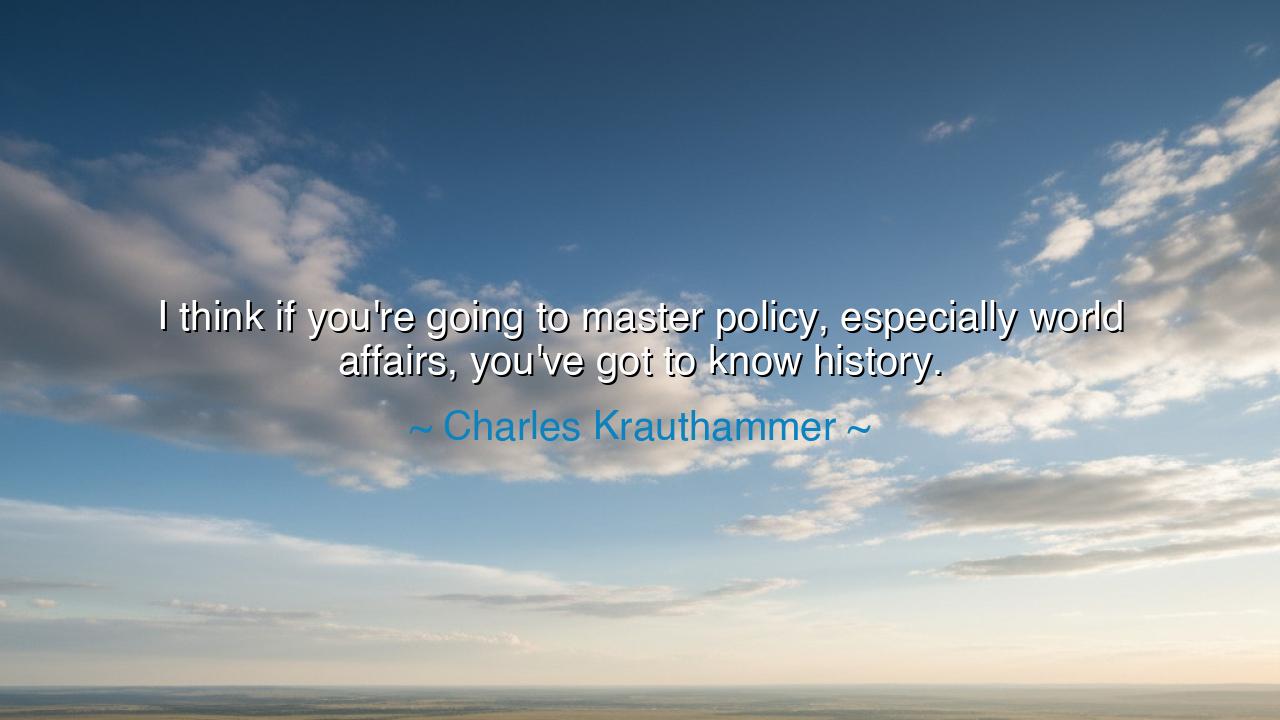
I think if you're going to master policy, especially world
I think if you're going to master policy, especially world affairs, you've got to know history.






“I think if you’re going to master policy, especially world affairs, you’ve got to know history.” – Charles Krauthammer
In this profound declaration, Charles Krauthammer, one of the great political minds of the modern age, distills a truth that is as ancient as governance itself: that wisdom in leadership is born of memory. His words are not a mere endorsement of study or scholarship, but a call to humility before the vast record of human experience. To “know history,” as he says, is not only to recall the past, but to understand the rhythms of power, ambition, and folly that have shaped civilizations. The wise ruler, the skilled diplomat, and the just policymaker all drink from this well — for history is not a museum of relics, but a living teacher, whispering the secrets of what has been tried, what has succeeded, and what has doomed empires to ruin.
The origin of this quote lies in Krauthammer’s long career as a political thinker and columnist — a man trained first in medicine, who then turned his sharp intellect toward the anatomy of nations. He believed that world affairs, though clothed in the modern garb of technology and diplomacy, are governed by timeless laws of human nature. The passions that drove Caesar, the fears that haunted Churchill, the ambitions that stirred Napoleon — these same forces still shape our age. And thus, Krauthammer argued, those who would seek to guide nations must first study the currents of history, lest they mistake the new for the unprecedented. For in truth, little in human affairs is new; only the faces and names change.
To master policy without knowing history is like steering a ship without a map, guided only by the stars of one’s own opinion. The seas of politics are vast and treacherous, and those who forget the reefs of the past are doomed to founder upon them. The great statesmen of the world — Lincoln, Churchill, De Gaulle, Mandela — were all, first and foremost, students of history. When Lincoln faced the moral crisis of slavery, he looked backward to the principles of the Founders. When Churchill stood against tyranny, he remembered the lessons of appeasement and the fall of Rome. Each of them understood that the past is the compass of the present, and that policy divorced from history becomes blind ambition.
Consider the story of George Marshall, the American general who, after the Second World War, conceived the Marshall Plan — a vision not merely of rebuilding Europe, but of preventing the seeds of another global conflict. Marshall had seen, as a soldier and as a student of history, how the victors of World War I had punished the defeated so harshly that resentment gave rise to Hitler’s Germany. He refused to let history repeat itself. Thus, by remembering the errors of the past, he crafted one of the most enlightened policies of the modern era, turning enemies into allies and transforming Europe into a bastion of peace. His wisdom was born not from ideology, but from historical insight.
Krauthammer’s words also carry a warning to the modern age — an age intoxicated by speed and innovation, where the lessons of yesterday are too easily dismissed as obsolete. Yet history, like a patient elder, waits for those who ignore her, and her punishments are merciless. Every generation that forgets its past is condemned to relive its tragedies — the cycles of war, greed, and disunity. To know history is not to be trapped by it, but to be liberated from its mistakes. It teaches perspective: that the crises of today are seldom unique, that humanity has endured worse and learned from it. The student of history sees patterns where others see chaos, and thus navigates the storms of politics with steadier hands.
In this sense, Krauthammer’s quote is not merely political — it is philosophical. For every life, not just every nation, is shaped by memory. The individual who forgets their own lessons is doomed to repeat their errors; the society that erases its history loses its identity. To study history is to understand human nature, and to understand human nature is to become wise. Policy, diplomacy, even leadership itself — all are extensions of the same eternal struggle to govern the impulses of mankind. And only by knowing the story of those who have walked before us can we hope to guide the path ahead.
So, dear listener, take this teaching as both warning and call to action: know your history. Not merely as a list of dates or deeds, but as the living pulse of the human story. Read of empires not to worship their grandeur, but to understand their fall. Study the mistakes of leaders not to judge them, but to avoid their ruin. And when you face decisions — whether in the councils of nations or in the quiet chambers of your own life — ask yourself: What does history whisper to me now? For as Krauthammer reminds us, policy without history is power without wisdom. But when guided by memory and humility, even the smallest decision becomes an act of enduring foresight.
Thus, let the words of Charles Krauthammer echo across the ages: those who would master the affairs of the world must first master the lessons of time. For in history lies not only the record of what was, but the promise of what may yet be — if only we have the wisdom to remember.






AAdministratorAdministrator
Welcome, honored guests. Please leave a comment, we will respond soon